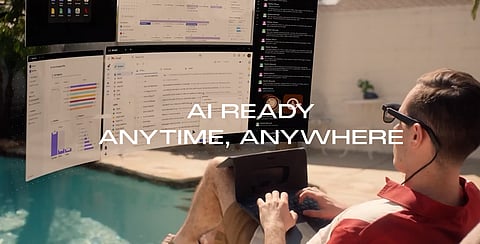Spacetop G1: The First Augmented Reality AR Laptop Computer is Coming Soon
AR not VR: Comparing Augmented Reality and Virtual Reality Adoption
Unlike Virtual Reality (VR), which has struggled to achieve widespread adoption beyond niche entertainment markets, AR has found practical, everyday use in various sectors. While VR offers immersive experiences, its adoption has been limited primarily to the gaming and entertainment sectors. High costs, the need for specialized equipment, and the potential for motion sickness have hindered its mainstream acceptance. In contrast, AR's ability to overlay digital information onto the real world using smartphones or lightweight headsets makes it more accessible and practical for everyday use.
Summarizing the Wall Street Journal article: Why Virtual Reality Needs to Get Real
Virtual Reality (VR) has faced difficulty becoming mainstream and is essentially entertainment not too many people seem excited about anymore, myself included.
Unlike Augmented Reality (AR), which has seamlessly integrated into industries like real estate and construction.
High Costs: VR systems are expensive, requiring high-end hardware, which limits accessibility for average consumers.
Usability Issues: Many users experience discomfort, such as motion sickness, and the bulky nature of VR headsets can be impractical for daily use.
Limited Content: There is still a lack of compelling VR content beyond gaming, leading to limited use cases appealing to a broader audience.
Social Acceptance: VR creates a fully immersive experience that can feel isolating, making it less practical for collaborative or social interactions compared to AR.
In summary, while AR enhances reality and finds practical applications, VR's high costs, usability issues, limited content, and social acceptance hurdles hinder its mainstream adoption.
META and the Metaverse: Challenges in VR Adoption
In the October 2021 New York Times article, "Facebook Rebrands as Meta and Focuses on the Metaverse," the strategic focus of the rebranding is discussed in detail.
Strategic Focus: The new name, Meta, reflects the company's commitment to VR and AR technologies, aiming to create an immersive digital universe.
Challenges:
Technical Hurdles: Building a functional metaverse requires advanced technology.
Privacy Concerns: Meta must address user trust and security issues. -
Adoption Rates: Success depends on widespread user adoption of VR and AR.
Meta's rebranding highlights a bold move into the future of immersive digital experiences, contrasting with VR's current struggles with high costs and usability issues.
Facebook rebranded to Meta, signaling a shift towards building the metaverse - a virtual reality space for user interaction.
Facebook has heavily invested in the Metaverse, a VR-based virtual world intended to create immersive social and business interactions. Despite the hype, the Metaverse VR has yet to achieve significant commercial success, facing challenges in user adoption and practical applications. While it holds potential for future growth, its current state contrasts sharply with the tangible, proven benefits of AR in various business contexts.
Spacetop G1 by Sightful: Use Cases Successful AR Applications
As an AI and tech writer for Resident Magazine, I’m always on the lookout for groundbreaking and cross-over advancements, and augmented reality (AR) is a game-changer in the real estate industry.
Retail and E-commerce: Companies like IKEA and Amazon have long used AR to allow customers to visualize furniture and products in their own homes before making a purchase. This "try before you buy" approach has boosted customer confidence and reduced return rates.
Healthcare: AR is revolutionizing medical training and surgery. Platforms like Microsoft's HoloLens enable surgeons to visualize complex anatomy and perform precise operations, while medical students use AR for immersive learning experiences.
Manufacturing and Maintenance: Firms such as Boeing and Bosch, and again Amazon, use AR to provide technicians with real-time, hands-free instructions during assembly and maintenance processes, increasing accuracy and reducing downtime.
How Augmented Reality Is Revolutionizing Real Estate
Considering AR applications in luxury real estate, the Realtor Magazine article "How Augmented Reality Is Revolutionizing Real Estate" provided some excellent insights.
Augmented Reality (AR) is revolutionizing real estate by transforming property marketing, viewing, and sales processes. AR enables virtual property tours, allowing buyers to explore homes remotely, enhancing convenience and accessibility. Interactive 3D models help buyers visualize different layouts and designs, aiding in informed decision-making. AR-enhanced property listings offer detailed information and immersive features like 360-degree images and floor plans. This technology also improves client engagement during meetings and open houses, providing real-time, interactive experiences. Developers use AR to visualize construction projects, identify issues, and present designs compellingly. Additionally, AR facilitates remote collaboration among agents, clients, and stakeholders, benefiting international buyers and investors. Overall, AR enhances the real estate industry by making the buying process more interactive, informative, and efficient.
VR Remains Promising while AG is Going About Business
In summary, AR's integration into real-world applications has driven its success in business, offering practical solutions that enhance productivity and customer engagement. Meanwhile, VR remains a promising but yet-to-be-fully-realized technology, predominantly cool but not yet commercially successful on a wide scale.
About the Author
Mark Derho is a seasoned expert in the Internet industry with over 25 years of experience in NYC's software development, digital marketing, and advertising sectors. A certified Google Partner, Mark specializes in content creation, AI chatbot development, open-source software, modern website design, and SEO/SEM marketing. He leads PR Website Agency and lives in Puerto Rico with his dog, Luno.
Links:
https://ikea.com/global/en/newsroom/innovation/ikea-launches-ikea-place-a-new-app-that-allows-people-to-virtually-place-furniture-in-their-home-170912/
https://www.microsoft.com/en-us/hololens
https://www.wsj.com/articles/what-virtual-reality-needs-to-get-real-1497951002
Inspired by what you read?
Get more stories like this—plus exclusive guides and resident recommendations—delivered to your inbox. Subscribe to our exclusive newsletter
Resident may include affiliate links or sponsored content in our features. These partnerships support our publication and allow us to continue sharing stories and recommendations with our readers.

